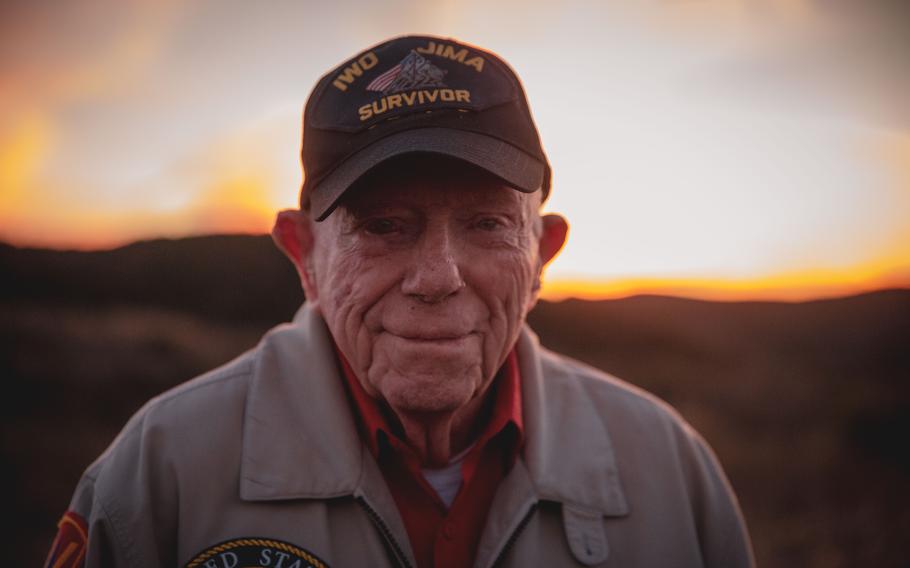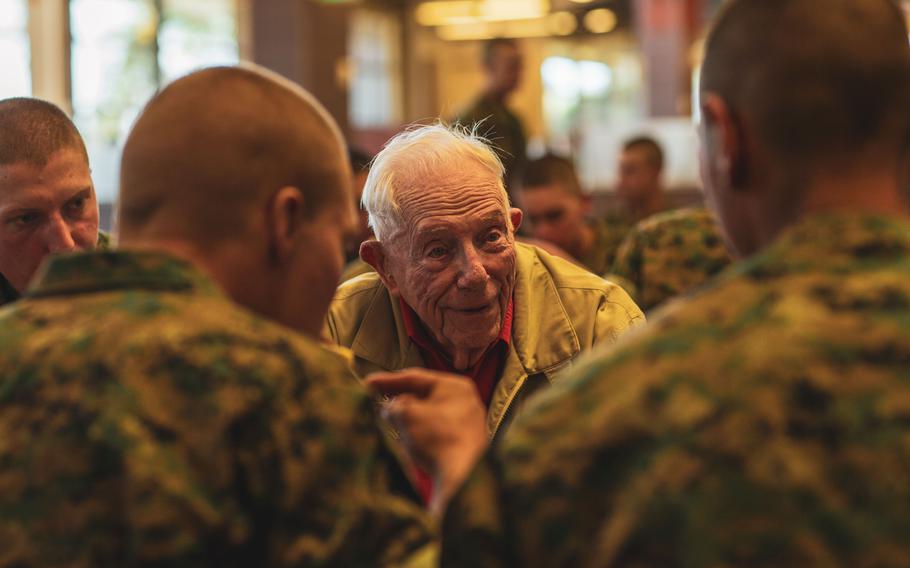
U.S. Marine Corps veteran Cpl. Don Graves poses for a photo at Marine Corps Base Camp Pendleton, California, Nov. 1, 2023. Graves, a distinguished WWII veteran who served with the 2nd Battalion, 28th Marine Regiment at Iwo Jima, visited Marine Corps Recruit Depot San Diego to observe training and interact with the Marines. (Sydney Smith/U.S. Marine Corps)
(Tribune News Service) — All it takes is a close of his eyes and Don Graves is a 19-year-old at the historic battle of Iwo Jima in World War II, wondering if he’d see his 20th birthday.
“I remember the bullets flying all around and wondering if I was going to be next,” Graves recalled. “Today, I think of my buddies that were killed. When I go out and speak and hear the audience applause, I give it to my buddies.”
Graves, who now lives in Keller, Texas, will turn 100 on May 3 with a public party from at the Hearsay Lounge in Arlington, Texas. Among his many memories, that memorable battle tops the list, with the 80th anniversary of its start being Feb. 19.
Graves, who served with the 2nd Battalion, 28th Marine Regiment, entered the battle with 335 men. He was one of only 18 survivors. Today, there are only four living survivors.
“Of the three other Marine Corps survivors I am aware of, I only know one of them. Billy Byrd of Jackson, Mississippi,” Graves said. “I visited with him in December of 2023 at his home and then saw him again while at the WWII Museum in New Orleans with the Gary Sinese Foundation in 2024.
“Billy and I were in the same unit. We both witnessed the flag raising on Mount Suribachi.”
The beach and a foxhole
“When I hit the beach on Iwo, men were dying all around me,” Graves said. “I said ‘God, if you will get me off of this beach, I will serve you the rest of my life.’”
Graves, who would become a pastor, flashed back to a time in a foxhole that still gives him chills.
“I was looking for snipers and would come down to shoot the bull every now and then. The CO came on the radio and said we needed to keep looking. The first sergeant had just been hit,” he said.
When the replacement arrived, he asked Graves for the binoculars.
“He got up in the same spot I had been in. The three of us started shooting the bull and all of a sudden we hear a noise and see him fall backwards,” Graves said. “His helmet fell off and inside his helmet was a picture of a young woman with a baby in her lap.”
Graves enlisted after Pearl Harbor was attacked. He was inspired by a speech from President Franklin Delano Roosevelt.
“I was sitting in a car with two of my buddies listening to the big bands. It was cold in Detroit and we had a blanket covering us,” he remembered. “The president came on the radio and addressed the nation. We were taught patriotism and history in school. We understood that defending our country was our duty.”
Graves grew up during the Great Depression and has a family military history. His dad served in the Marines in World War I. His younger siblings, brother Bill and sister Sally, served in the Navy and Marines.
His oldest son, Tim, served in the Army after the Korean War. Son Mike retired from the Navy after 26 years in 2003.
Graves was given one of the most dangerous jobs, company flame thrower. He carried an explosive device on his back.
“I was walking to the PX one day and the skipper walked up and told me I was to be the company flame thrower. I asked him why since I was so short and small,” Graves said.
It was a good question. The flame thrower weighed 72 pounds with two fuel tanks and a center tank for compressed nitrogen.
“The skipper told me that was why he picked me. I was short and moved quickly and that would keep me alive,” Graves said. “It was a job. That’s the way I had to think about it. It’s sad to say but you become callous. You realize it’s kill or be killed.”
First knowledge
No American had ever fought on Japanese soil before Iwo Jima, which Graves said he and his buddies had never heard of until the day before they arrived.
More than 7,000 Marines were killed and 20,000 wounded during the historic battle from Feb. 19 to March 26, 1945, when Marines fought to take control of the eight-square mile island from the Imperial Army of Japan. The island would give the U.S. a staging area for a potential invasion of the Japan mainland.
“That morning we were served steaks and eggs for breakfast. I asked my buddy what’s up with the steak and eggs? He said, ‘Graves, think about it, what do they serve prisoners before they are executed?’
“But we needed that island. The Japanese were radioing ahead to the mainland when our planes would come over headed there. They didn’t stand a chance if we didn’t take that island.”
Graves recalls sitting in a foxhole and suddenly wanting some hot chocolate.
“We were kids, we didn’t drink coffee,” he said. “I took some water and a chocolate bar out of our rations and used some demolition to heat it.”
After a while the smell was wafting through the air.
“All of a sudden I hear a Japanese voice say, ‘Hey Marine, very good hot chocolate. You bring hot chocolate here,’” Graves said with a smile. “I said ‘Oh no, you want hot chocolate, you come get it.’ We all had a good laugh.”

U.S. Marine Corps veteran Cpl. Don Graves speaks to new Marines during breakfast at Marine Corps Base Camp Pendleton, California, Nov. 1, 2023. (Sydney Smith/U.S. Marine Corps)
Sharing the story
Graves shares the experience through his connection with the Fort Worth nonprofit veterans organization Roll Call.
“Don speaks and sings all over the country. He is passionate about patriotism,” said Roll Call President Mary Staffield. “He will sing anywhere, anytime. His favorite is ‘God Bless America,’ but he also loves to sing ‘Danny Boy.’ It gives you chills to hear his thunderous voice.
“At events he is, as it should be, the center of attention. He’s taking pictures and signing things. That is his time with those who love him.”
Coming home
When Graves and the remaining soldiers were released to leave the island, they were told to go through their cemetery and say goodbye to their buddies.
“As we approached the gate, I saw everyone stopping to read a piece of paper posted there. This is what it said, ‘Hey Fellas, when you get back home, tell them we did our best that they may have many more tomorrows,’” Graves said.
“When I speak to people, I always tell them that they are living those many more tomorrows.”
©2025 Fort Worth Star-Telegram.
Visit star-telegram.com.
Distributed by Tribune Content Agency, LLC.